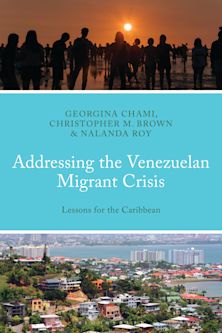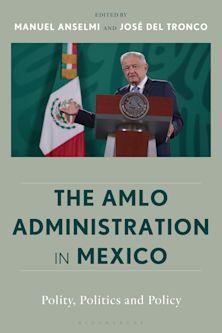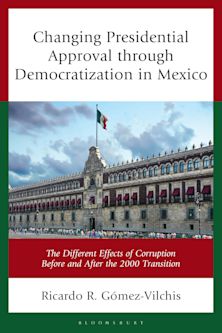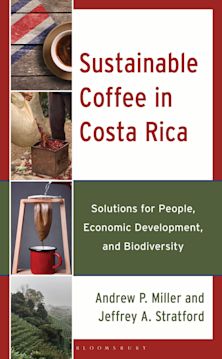- Home
- ACADEMIC
- Politics & International Relations
- Latin American Politics
- Fragile States in the Americas
Fragile States in the Americas
Jonathan D. Rosen (Anthology Editor) , Hanna Samir Kassab (Anthology Editor) , Marlon Anatol (Contributor) , Emily D. Bello-Pardo (Contributor) , Adriana Beltrán (Contributor) , Marten Brienen (Contributor) , Ted Galen Carpenter (Contributor) , Lucía Dammert (Contributor) , Jean-Claude Garcia-Zamor (Contributor) , Eric Golnick (Contributor) , Adam Iscacson (Contributor) , Hanna Samir Kassab (Contributor) , Mark Kirton (Contributor) , Paul Rexton Kan (Contributor) , Bradford R. McGuinn (Contributor) , Randy Pestana (Contributor) , Christa L. Remington (Contributor) , Jonathan D. Rosen (Contributor) , John Twichell (Contributor) , Dianne Williams (Contributor) , Christine Zaino (Contributor) , Roberto Zepeda Martínez (Contributor)
Fragile States in the Americas
Jonathan D. Rosen (Anthology Editor) , Hanna Samir Kassab (Anthology Editor) , Marlon Anatol (Contributor) , Emily D. Bello-Pardo (Contributor) , Adriana Beltrán (Contributor) , Marten Brienen (Contributor) , Ted Galen Carpenter (Contributor) , Lucía Dammert (Contributor) , Jean-Claude Garcia-Zamor (Contributor) , Eric Golnick (Contributor) , Adam Iscacson (Contributor) , Hanna Samir Kassab (Contributor) , Mark Kirton (Contributor) , Paul Rexton Kan (Contributor) , Bradford R. McGuinn (Contributor) , Randy Pestana (Contributor) , Christa L. Remington (Contributor) , Jonathan D. Rosen (Contributor) , John Twichell (Contributor) , Dianne Williams (Contributor) , Christine Zaino (Contributor) , Roberto Zepeda Martínez (Contributor)
You must sign in to add this item to your wishlist. Please sign in or create an account
Description
The Americas face many security challenges, including drug trafficking, organized crime, guerrilla movements, terrorism, and environmental challenges. Experts have long debated whether some countries in the region can be classified as failed states. While various states in the Americas have been labeled as failed states, calling a country a failed state is quite controversial and requires a precise definition of what constitutes a failed state. This book instead discusses fragile states in the Americas. Fragile states are weak states that are fertile grounds for organized crime groups and illegal actors as such groups are able to infiltrate the state apparatus through corruption. The goal of this book is to examine fragile states in the region and the major security challenges that these states face. The cause of state fragility is different for various states.
Theoretically, the work will conceptualize the meaning of fragility as it relates to state survival and autonomy. Empirically, the book focuses on contemporary threats to the survival of fragile states in the Americas. The book explains and analyzes the main political, security, and economic challenges of these states. It employs a wide array of cases that delve into the security and economic threats and priorities of states in the Americas.
Table of Contents
2. An Ominous Future: Narco-Violence in Mexico from 2006–2016
3. Will the Rebellion for the Rule of Law Prevail in Guatemala?
4. The Cost of Failed Leadership: Corruption and Conflict in Honduras
5. Where Murder is Easy: The Fragile State of El Salvador’s Liberalism
6. Progress and Backsliding: State Fragilities and Colombia’s Post-Conflict Transition
7. The Peruvian Perfect Storm: State Fragility, Corruption and Organized Crime
8. Triple Threat: Political, Economic, and Security Fragility in Venezuela
9. The Ungovernable State: Bolivia in the Age of Morales
10. Weak States and Security Challenges: The Case of Guyana
11. Brazil: An Intermediate State with a Fragile Democratic Regime12. Haiti: Fragile State or Failed Nation?
13. An Assessment of Trinidad and Tobago as a Fragile State
14. The Obama Administration’s Foreign Policy Challenges in the Americas
15. United States Defense Policy in Latin America and the Caribbean
16. Latin America and Lebanon: A Comparative Study of Fragility
Product details
| Published | 07 Dec 2016 |
|---|---|
| Format | Ebook (Epub & Mobi) |
| Edition | 1st |
| Extent | 376 |
| ISBN | 9781498543576 |
| Imprint | Lexington Books |
| Illustrations | 19 b/w illustrations; 5 tables |
| Series | Security in the Americas in the Twenty-First Century |
| Publisher | Bloomsbury Publishing |
About the contributors
Reviews
-
Through the use of case studies intended to illuminate the many security challenges facing Latin America – including drug trafficking, organised crime, terrorism and more – the authors seek to conceptualise the idea of state fragility. The authors suggest that, without serious reform efforts aimed, for example, at rooting out corruption, progress cannot be made.
Survival: Global Politics and Strategy
-
In a larger regional context of historically unprecedented levels of electoral democracy and more than a decade of sustained economic growth, this volume of original contributions serves as a cautionary tale of the multiple challenges still facing many countries of Latin America and the Caribbean. With impressive sets of data-based country-level research, contributors analyze distressingly high levels of criminal violence, drug trafficking, and corruption in a context of ongoing impunity fostered by weak institutions and leaders. In addition, analyses of recent U.S. policy make a compelling case that approaches have either failed to address the problems these beleaguered democracies are facing or have actually made them worse. A must-read for scholars and policy makers alike.
David Scott Palmer, Boston University
-
The contributors to this volume provide insightful analyses of the factors that destabilize states and threaten democracy in the nations of the Americas. The book’s framing device—state fragility—is a subtle yet useful analytic for conceptualizing the conditions of governance and facilitating comparison across and between states. The case studies collected here will be an invaluable resource to scholars from a range of disciplines concerned with the histories, the present realities, and the possible futures of states and civil societies in the region.
Daniel M. Goldstein, professor emeritus, Rutgers University

































